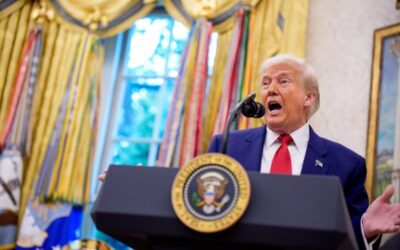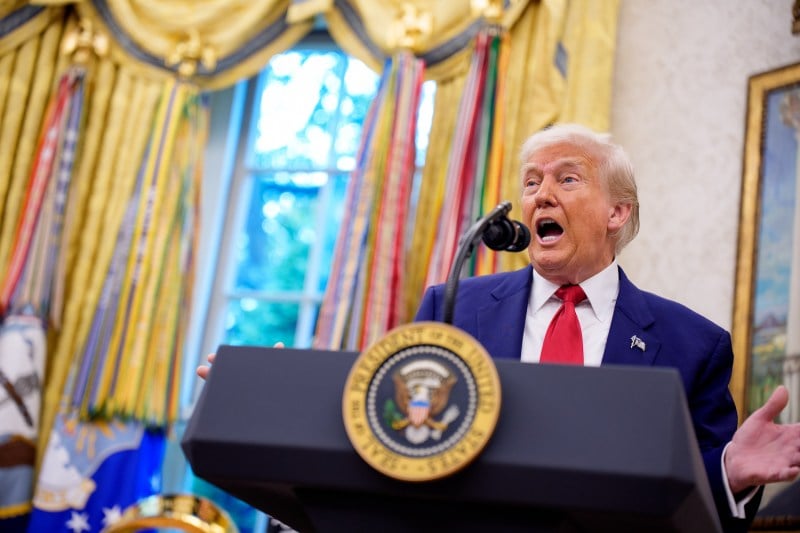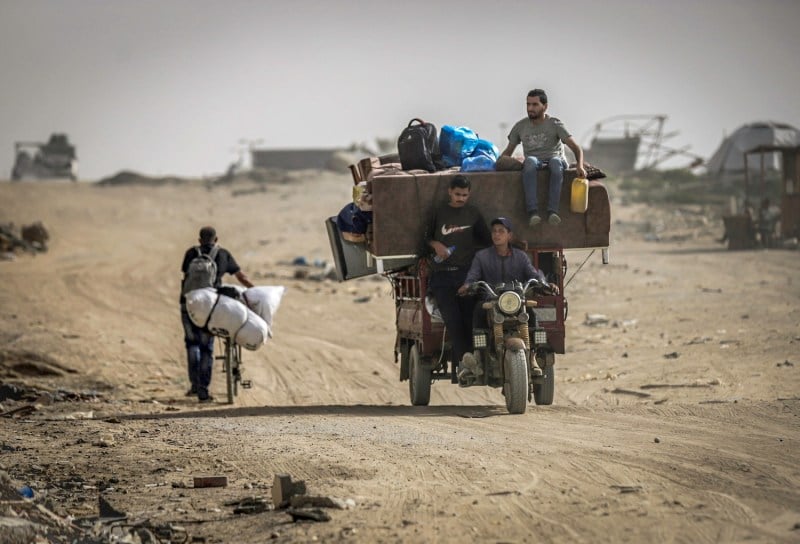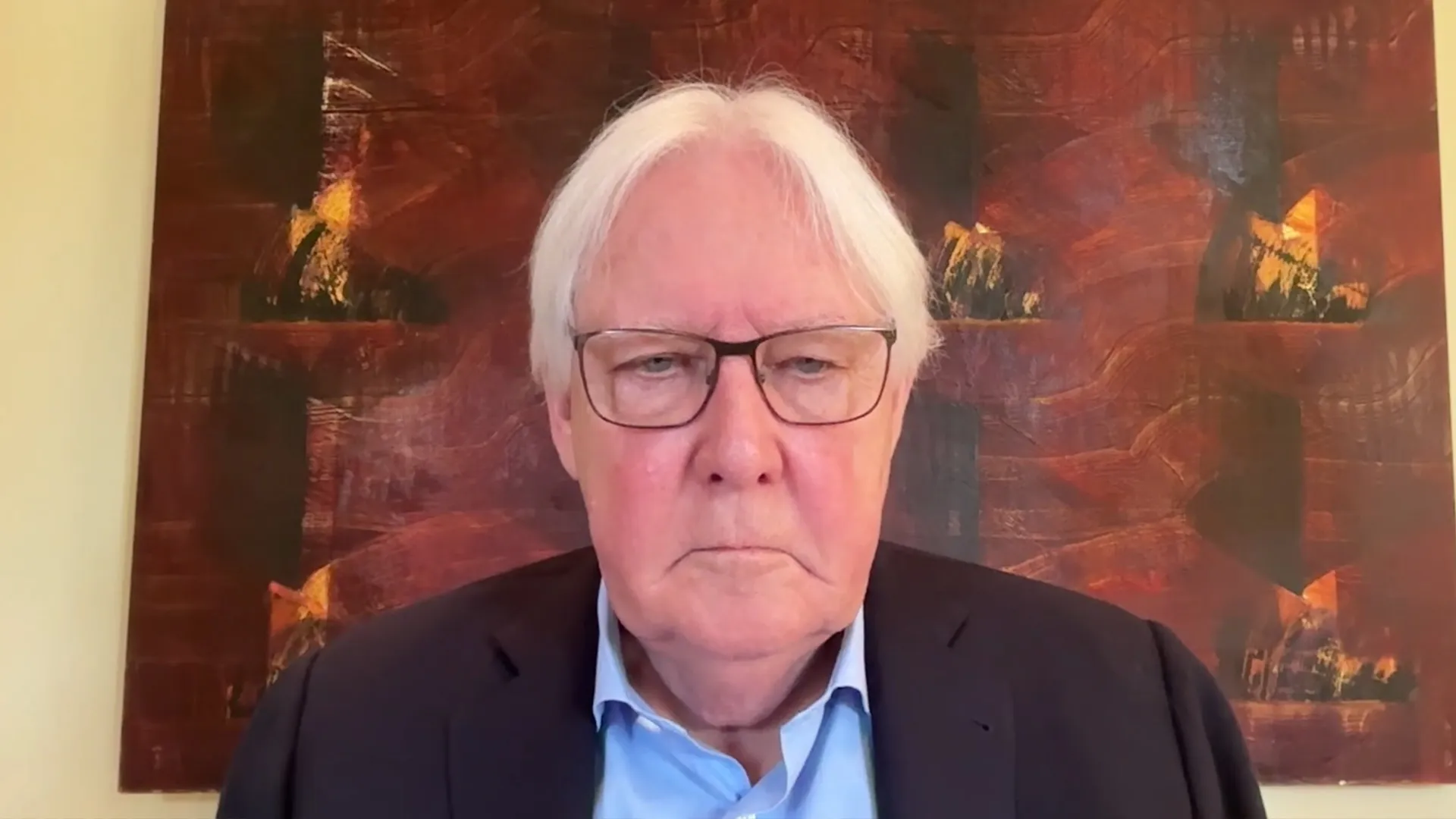Thousands of Palestinians Storm Aid Distribution Site in Gaza

Thousands of Palestinians Storm Aid Distribution Site in Gaza
International agencies have criticized the Gaza Humanitarian Foundation for politicizing humanitarian assistance.
Displaced Palestinians receive food packages from the Gaza Humanitarian Foundation in the southern Gaza city of Rafah on May 27. AFP via Getty Images
Welcome back to World Brief, where we’re looking at the threat of famine in Gaza, minimal progress for Russia-Ukraine peace efforts, and a car ramming in the United Kingdom.
Widespread Hunger
Chaos erupted at an aid distribution site in the southern Gaza city of Rafah on Tuesday, when thousands of Palestinians stormed a facility where the U.S.- and Israel-backed Gaza Humanitarian Foundation (GHF) was handing out food.
Welcome back to World Brief, where we’re looking at the threat of famine in Gaza, minimal progress for Russia-Ukraine peace efforts, and a car ramming in the United Kingdom.
Widespread Hunger
Chaos erupted at an aid distribution site in the southern Gaza city of Rafah on Tuesday, when thousands of Palestinians stormed a facility where the U.S.- and Israel-backed Gaza Humanitarian Foundation (GHF) was handing out food.
According to locals, the volume of people seeking aid became so great that the Israel Defense Forces opened fire from a helicopter to dispel the crowds. The Israeli military denied doing so, though it did admit to firing warning shots outside of the compound. And the Gaza Humanitarian Foundation said that its team had to pull back to allow people to “take aid safely and dissipate” to avoid casualties.
At the same time—and without evidence—Israel and the GHF accused Hamas of trying to block civilians from reaching the aid distribution site. Hamas has denied the allegations.
“The real cause of the delay and collapse in the aid distribution process is the tragic chaos caused by the mismanagement of the same company operating under the Israeli occupation’s administration in those buffer zones,” said Ismail al-Thawabta, the director of the Hamas-run Gaza government media office, in an interview with Reuters on Tuesday. “This has led to thousands of starving people, under the pressure of siege and hunger, storming distribution centres and seizing food, during which Israeli forces opened fire.”
The Gaza Humanitarian Foundation is a controversial new Israel- and U.S.-backed group—composed of American private security contractors, former military officials, and humanitarian aid officials—that has been tasked with distributing food since Israel lifted its almost three-month blockade on aid entering the territory. By late afternoon on Tuesday, the GHF said it had provided around 462,000 meals to Palestinians.
However, the United Nations and international aid agencies have boycotted the foundation for its apparent close ties to the Israeli government and reported plans to use facial recognition technology to track who accesses its aid. Israeli officials maintain that such measures are necessary to prevent anyone connected to Hamas from receiving the assistance. However, many Palestinians and rights activists fear that such information could allow the Israeli government to track and potentially target Gaza residents.
“Humanitarian assistance must not be politicized or militarized,” said International Committee of the Red Cross spokesperson Christian Cardon, with Norwegian Refugee Council chief Jan Egeland adding that “[w]e cannot have a party to the conflict decide where, how, and who will get the aid.”
The foundation received further criticism from its own head, Jake Wood, after he unexpectedly resigned on Sunday, shortly before the group was set to begin operating, saying it was unable to operate independently. “It is clear that it is not possible to implement this plan while also strictly adhering to the humanitarian principles of humanity, neutrality, impartiality, and independence, which I will not abandon,” Wood said in a statement distributed by the GHF.
Widespread hunger remains a major concern in Gaza, where the 19-month war and weekslong aid blockade have caused significant food shortages and skyrocketing prices. Since Israeli Prime Minister Benjamin Netanyahu lifted the blockade this month, Israeli officials said they have allowed at least 665 truckloads of aid, including food and medical supplies, into Gaza. However, the U.N. World Food Program warned on Sunday that this assistance is but a “drop in the bucket” for what is needed to reverse the threat of famine in the territory.
Today’s Most Read
- How America Blew Its Unipolar Moment by Max Bergmann
- Turkish Guns Are Taking Over the U.S. Market by Naomi Cohen
- We Can No Longer Dismiss Trump’s Blatant Racism by Howard W. French
What We’re Following
Stalled peace efforts. Russian Foreign Minister Sergey Lavrov met with Turkish Foreign Minister Hakan Fidan in Moscow on Tuesday to discuss ongoing efforts to end the Russia-Ukraine war. Fidan met with Russian President Vladimir Putin and lead Moscow negotiator Vladimir Medinsky the day before. Following largely failed direct talks in Istanbul earlier this month, though, peace efforts in the conflict have stalled, and many foreign powers are losing their patience.
Putin has gone “absolutely CRAZY!” U.S. President Donald Trump wrote on Truth Social on Sunday, adding that the Russian leader is “needlessly killing a lot of people.” On Tuesday, Trump reiterated this concern by posting that Putin is “playing with fire!” The Trump administration has previously championed its close relationship with Moscow and even parroted Kremlin talking points, such as the false claim that Ukraine started the war.
German Chancellor Friedrich Merz announced on Monday that Germany, France, the United Kingdom, and the United States would lift its restrictions on the range of weapons being sent to Ukraine for use against Russian forces. And on Tuesday, media reported that Trump is considering imposing additional sanctions on Moscow in the coming days in the aftermath of another deadly Russian drone and missile attack, which Ukrainian officials have called the largest such assault yet.
Car ramming in Liverpool. Four people remained in critical condition on Tuesday after a car plowed into a crowd of Liverpool soccer fans in the United Kingdom on Monday, injuring more than 50 attendees. British police believe that the incident was isolated and not an act of terrorism. It is unclear how the car gained access to the street where the Premier League was holding its 10-mile parade, of which around 1 million people attended.
The suspect is a 53-year-old white British man from the city of Liverpool. He has since been taken into custody.
The Liverpool area has been the site of several deadly incidents in recent years. Most notably, 97 Liverpool fans were killed during a crowd crush at Hillsborough Stadium in 1989. In 2021, a man detonated an explosive device outside of Liverpool Women’s Hospital. And last July, three young girls were stabbed at a dance studio just north of the city.
A Maduro victory. Venezuela’s ruling party claimed late Sunday to have won nearly 83 percent of the vote in this weekend’s legislative and regional elections. Among the biggest wins for President Nicolás Maduro’s United Socialist Party was securing control of the governor’s seat of Zulia; Zulia is the country’s most populous state, the center of its oil wealth, and one of the last opposition strongholds.
Maduro called the results a “victory of peace and stability,” as the opposition maintained control of the governorship of only one state, Cojedes. However, rights activists were quick to denounce the election, saying that it lacked the minimum requirements needed to be considered democratic.
Many opposition leaders—including exiled figure María Corina Machado and Edmundo González, the winner of last July’s disputed presidential election—urged their supporters to boycott the vote as a way to signify their distrust in the system. Evidence of voter fraud marred Venezuela’s presidential election last year, during which Maduro claimed victory to secure greater control of the country and crack down on political dissidents.
Odds and Ends
French President Emmanuel Macron kicked off his weeklong tour of Southeast Asia on Sunday with a bang—er, slap. Moments before disembarking from his plane in Vietnam, video footage caught Macron’s wife, Brigitte, pushing her husband in the face. While the French president has tried to laugh it off as the couple “joking around,” the look of annoyance on Macron’s face post-shove says it all.
Alexandra Sharp is the World Brief writer at Foreign Policy. Bluesky: @alexandrassharp.bsky.social X: @AlexandraSSharp
Stories Readers Liked
In Case You Missed It
A selection of paywall-free articles

Four Explanatory Models for Trump’s Chaos
It’s clear that the second Trump administration is aiming for change—not inertia—in U.S. foreign policy.




















Join the Conversation
Commenting is a benefit of a Foreign Policy subscription.
Subscribe
Subscribe
Already a subscriber?
.
View Comments
Join the Conversation
Join the conversation on this and other recent Foreign Policy articles when you subscribe now.
Subscribe
Subscribe
Not your account?
View Comments
Join the Conversation
Please follow our comment guidelines, stay on topic, and be civil, courteous, and respectful of others’ beliefs.
View Comments
Change your username |
Log out
Change your username:
CANCEL
Confirm your username to get started.
The default username below has been generated using the first name and last initial on your FP subscriber account. Usernames may be updated at any time and must not contain inappropriate or offensive language.